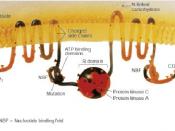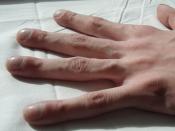Facts about Cystic Fibrosis
Cystic Fibrosis is a chronic, hereditary disease that affects many of the body's organ systems.
Cystic Fibrosis is a disease that affects more then 30,000 children and adults in the United States.
In Cystic Fibrosis, some of the thin, easy-flowing mucus in the body's respiratory and digestive systems get thicker. This makes it harder to breathe.
The sticky mucus also blocks the easy flow of digestive acids and enzymes from the pancreas and liver to the intestines.
Without adequate amounts of these digestive fluids in the intestines, people with CF cannot break down their food into the substances the body needs for nourishment.
CF is cause by mutation in a gene on chromosome 7. Chromosome 7 is one of 23 pairs of chromosomes that are each person's genetic makeup.
Symptoms
Cystic Fibrosis affects each person differently. Many people with CF do not appear to be severely ill.
In general, people with CF have some or all of these symptoms:
Salty-tasting skin and sweat
Persistent cough or wheezing
Many respiratory infections
Bulky, smelly stools or bowel movements
Nasal polyps (small growths in the nose)
Enlargement of the fingertips and toes (clubbing).
And also, people with CF may eat large amounts of food but still be hungry.
This is because the food is not being digested properly, because the mucus is blocking the ability of digestive enzymes and acids to break down food and absorb nutrients.
Treatments/Cures/Support Groups
Since the discovery of the CFTR gene there have been many discoveries in the way of treatment for cystic fibrosis. Cystic fibrosis is an ongoing disease that as of yet contains no cure.
This is way regular check-ups are necessary. When treating cystic fibrosis one of the main thing that needs to be done is drainage of the airways...


